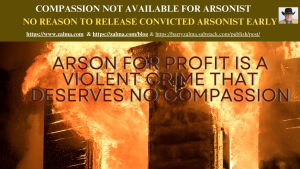Compassion Not Available for Arsonist

Post 4767
See the full video at https://rumble.com/v4mua6c-compassion-not-available-for-arsonist.html and at https://youtu.be/ab6rFw_DLSE
In United States Of America v. Jonathan Paul Wiktorchik, Jr., No. 23-2564, United States Court of Appeals, Third Circuit (March 25, 2024) Federal Prisoner Jonathan Wiktorchik appealed, acting as his own lawyer, from the District Court’s denial of his motion for compassionate release.
THE CONVICTION
In 2011, after a jury trial in the Eastern District of Pennsylvania, Wiktorchik was convicted of arson, use of fire to commit a felony, mail fraud, and making false statements. Wiktorchik’s conviction was based on a fire he deliberately set to his chiropractic office, which also destroyed four other businesses. Wiktorchik repeatedly lied to investigators regarding his involvement and changed his story on multiple occasions. He was sentenced to 204 months of imprisonment and has an anticipated release date of August 23, 2025.
MOTION FOR COMPASSIONATE RELEASE
In May 2023, Wiktorchik filed a motion for compassionate release arguing that his chronic medical conditions and the COVID-19 pandemic supported his early release. Wiktorchik, who is not vaccinated, was hospitalized in January 2021 after contracting COVID-19 and has since been reinfected at least twice. He asserted that he now suffers from “long COVID” and that each reinfection exacerbated the condition, “leading to further dehabilitating [sic] and deteriorating health conditions” for which he was not receiving proper treatment.
The District Court denied relief. It concluded both that Wiktorchik had not established any extraordinary and compelling reason for his release, and that the relevant sentencing factors weighed against release.
ANALYSIS
The Third Circuit reviews such an appeal for abuse of discretion by a district court’s order denying a motion for compassionate release, including a determination that the sentencing factors do not weigh in favor of granting compassionate release. The Third Circuit will not disturb the District Court’s decision unless there is a definite and firm conviction that it committed a clear error of judgment in the conclusion it reached upon a weighing of the relevant factors. The Third Circuit found it could summarily affirm the district court’s decision if the appeal fails to present a substantial question.
The compassionate-release statute states that a district court may reduce a defendant’s term of imprisonment if extraordinary and compelling reasons warrant such a reduction. Before granting compassionate release, a district court must consider the factors set forth in the statute to the extent that they are applicable. Those factors include the nature and circumstances of the offense, the history and characteristics of the defendant, and the need for the sentence to reflect the seriousness of the offense, promote respect for the law, provide just punishment, afford adequate deterrence, and protect the public from future crimes by the defendant.
Compassionate release is discretionary, not mandatory. Therefore, even if a defendant is eligible for it, a district court may deny compassionate release upon determining that a sentence reduction would be inconsistent with the statute’s requirements.
In reaching its decision the Third Circuit was unable to discern abuse of discretion in the District Court’s conclusion that compassionate release was not appropriate. The District Court appropriately considered that Wiktorchik “has a history of committing economic as well as dangerous crimes,” and observed that the current offenses were committed less than a year after Wiktorchik was convicted of insurance fraud. It explained that Wiktorchik’s crimes showed a disregard for the property of others, noting that other businesses were damaged as a result of the arson. In determining that the factors did not warrant compassionate release the District Court concluded that Wiktorchik received just punishment for his offenses and that adequate deterrence and the protection of the public would be undermined and at risk if Wiktorchik were released for compassionate reasons.
Wiktorchik argued that the District Court failed to give sufficient weight to his rehabilitative efforts, including his lack of a disciplinary record while incarcerated. However, even considering these efforts,
Because this appeal does not present a substantial question, the District Court’s judgment was summarily affirmed.
Arson-for-Profit is a violent type of insurance fraud. It not only destroys the property that was insured for the benefit of the arsonist it destroys the property of other and often causes the injury or death of innocents, neighbors, and firefighters. It is a heinous crime and the defendant must serve the entire sentence to protect the public at large from his criminal acts and deter others from attempting the same crime.
 (c) 2024 Barry Zalma & ClaimSchool, Inc.
(c) 2024 Barry Zalma & ClaimSchool, Inc.
Please tell your friends and colleagues about this blog and the videos and let them subscribe to the blog and the videos.
Subscribe to my substack at https://barryzalma.substack.com/publish/post/107007808
Go to X @bzalma; Go to Newsbreak.com https://www.newsbreak.com/@c/1653419?s=01; Go to Barry Zalma videos at Rumble.com at https://rumble.com/c/c-262921; Go to Barry Zalma on YouTube- https://www.youtube.com/channel/UCysiZklEtxZsSF9DfC0Expg.
Go to the Insurance Claims Library – https://lnkd.in/gwEYk.
Like this:
Loading…
Related
About Barry Zalma
An insurance coverage and claims handling author, consultant and expert witness with more than 48 years of practical and court room experience.







